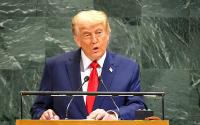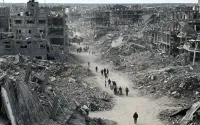21 September 2004The Guardian
Poor Mr Baradei, His mission is a parody: He tells the states (with some aplomb) They can and cannot have the bomb
Here is the world's most nonsensical job description. Your duty is to work tirelessly to prevent the proliferation of nuclear weapons. And to work tirelessly to encourage the proliferation of the means of building them. This is the task of the head of the International Atomic Energy Agency, Mohamed El Baradei.
He is an able diplomat, and as bold as his predecessor, Hans Blix, in standing up to the global powers. But what he is obliged to take away with one hand, he is obliged to give with the other. His message to the non-nuclear powers is this: you are not allowed to develop the bomb, but we will give you the materials and expertise with which you can build one. It is this mortal contradiction which permitted the government of Iran this weekend to tell him to bog off.
His agency's motto - "Atoms for Peace" - wasn't always a lie. In 1953, when Eisenhower founded it with his famous speech to the United Nations, people really seemed to believe that nuclear fission could solve the world's problems. An article in the Herald Tribune, for example, promised that atomic power would create "an earthly paradise... Our automobiles eventually will have atomic energy units built into them at the factory so that we will never have to refuel them... In a relatively short time we will cease to mine coal."
Eisenhower seemed convinced that the nuclear sword could be beaten into the nuclear ploughshare. "It is not enough to take this weapon out of the hands of the soldiers. It must be put into the hands of those who will know how to strip its military casing and adapt it to the arts of peace." The nuclear powers, he said, "should... make joint contributions from their stockpiles of normal uranium and fissionable materials" which should then be given to "the power-starved areas of the world", "to provide abundant electrical energy". This would give them, he argued, the necessary incentive to forswear the use of nuclear weapons.
The IAEA, its statute says, should assist "the supplying of materials, equipment, or facilities" to non-nuclear states. It should train nuclear scientists and "foster the exchange of scientific and technical information". Its mission, in other words, is to prevent the development of nuclear weapons, while spreading nuclear technology to as many countries as possible. It is also responsible for enforcing the nuclear non-proliferation treaty, which has the same dual purpose.
There might have been a case, while Eisenhower's dream could still be dreamt. But to persist with this programme long after it became clear that it caused proliferation, not containment, suggests that the global powers are living in a world of make-believe. The International Atomic Energy Agency has put nuclear technology "into the hands of those who will know how to strip its civilian casing and adapt it to the arts of war".
It's not difficult. Every state which has sought to develop a nuclear weapons programme over the past 30 years - Israel, South Africa, India, Pakistan, North Korea and Iraq - has done so by diverting resources from its nuclear power programme. In some cases they built their weapons with the direct assistance of Atoms for Peace.
India developed its bomb with the help of fissionable material and expertise from Canada, the US, Germany, France, Norway and the UK. Pakistan was able to answer the threat with the help of Canada, the US, Germany, France, Belgium, China and the UK. In the name of peace, we equipped these nations for total war.
Now there are about 20 countries which, as a result of foreign help for their civilian nuclear programmes, could, if they choose, become nuclear weapons states within months. When Russia shipped uranium and the technologies required to build a bomb to Iran, it not only had a right to do so: under the non-proliferation treaty, it had a duty to do so.
It's not yet clear whether Iran has stepped over the brink. It is plainly enriching uranium and producing heavy water, which could enable it to build both uranium- and plutonium-based bombs. But both processes are also legitimate means of developing materials for nuclear power generation. To enrich uranium from power-grade to bomb-grade you need only pass it through the centrifuges a few more times. The non-proliferation treaty gives Iran both the right to own the materials and the cover it requires to use them for a weapons programme. If you want to build a bomb, you simply sign the treaties, join the IAEA, then use your entitlements to do what they were designed to prevent.
Iran certainly has plenty of motives for seeking to become a nuclear power. Israel has enough nuclear weapons to wipe it off the map. Sheltered by the US, it has no incentive to dismantle them and sign the non-proliferation treaty. Both the US and the UK have abandoned their own obligations to disarm, and appear to be contemplating a new generation of nuclear weapons. Both governments have also suggested that they would be prepared to use them pre-emptively. Iran is surrounded by American military bases, and is one of the two surviving members of the axis of evil. The other one, North Korea, has been threatening its neighbours with impunity. Why? Because it has the bomb. If Iran is not developing a nuclear weapons programme, it hasn't understood the drift of global politics.
But what can El Baradei do? He can beg Iran to stop developing enriched uranium, but the treaty he is supposed to be enforcing gives him no authority to do so: the government has pointed out that it's legally entitled to pursue all the processes he fears. This is why he's seeking to persuade it to stick to "voluntary agreements".
I hope I don't need to explain how dangerous all this is. The official nuclear powers have junked the non-proliferation treaty, while the non-nuclear powers are using it to develop their own programmes. If Hizbullah clobbers Israel, Israel might turn on Iran, and the Middle East could go up in nuclear dust, rapidly followed by everyone else who has decided to join the second nuclear arms race. And the man charged with preventing this from happening is still facilitating it.
The obvious conclusion is that you can't phase out nuclear weapons without phasing out nuclear power. Now that the old treaty has become worse than useless, now that the promise of an earthly paradise of free power and electricity too cheap to meter has been shown to be false, isn't it time for a new nuclear treaty, based not on Eisenhower's chiliastic fantasy but on grim global realities? Isn't it time for Mr Baradei to stop destroying the world in order to save it?






